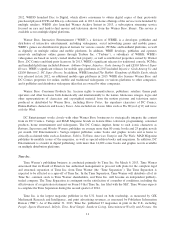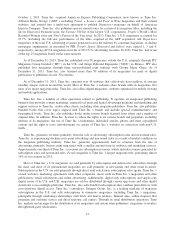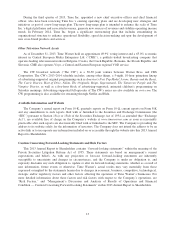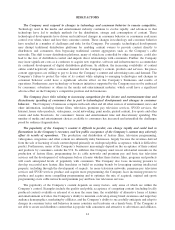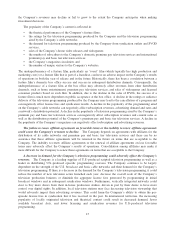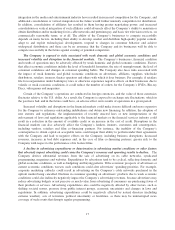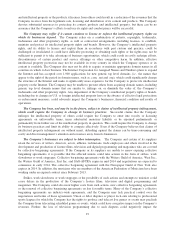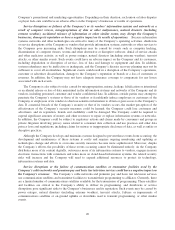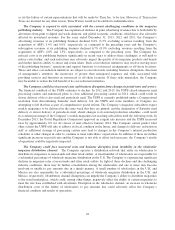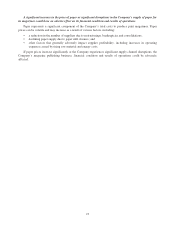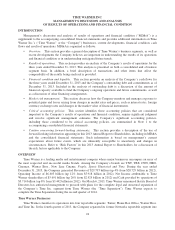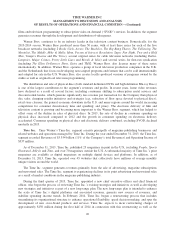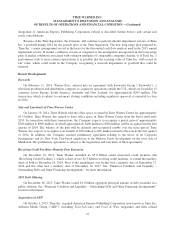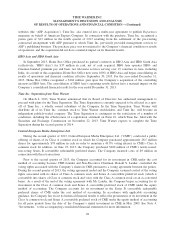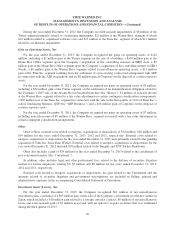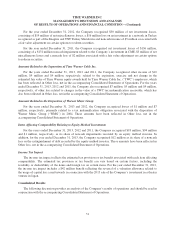Time Magazine 2013 Annual Report Download - page 37
Download and view the complete annual report
Please find page 37 of the 2013 Time Magazine annual report below. You can navigate through the pages in the report by either clicking on the pages listed below, or by using the keyword search tool below to find specific information within the annual report.The Company’s businesses are subject to regulation in the U.S. and internationally, which could cause the
Company to incur additional costs or liabilities or disrupt its business practices. The Company’s businesses
are subject to a variety of U.S. and international laws and regulations. The Company could incur substantial costs
to comply with new laws or regulations or changes in interpretations of laws or regulations or substantial
penalties or other liabilities if it fails to comply with them. Compliance with new laws or regulations also could
cause the Company to change or limit its business practices in a manner that is adverse to its businesses. In
addition, if there are changes in laws or regulations that provide protections that the Company relies on in
conducting its businesses, they could subject the Company to greater risk of liability and could increase
compliance costs or limit the Company’s ability to operate certain lines of business.
The Company’s enterprise efficiency initiatives present various risks, including that the Company may not
realize the financial and strategic goals relating to the initiatives. The Company has launched multi-year
enterprise efficiency initiatives to deliver certain business support services (e.g., real estate and certain
information technology and human resources functions) centrally to the Company’s divisions. In connection with
these initiatives, the Company may incur greater than anticipated expenses, fail to realize anticipated benefits,
experience business disruptions or have difficulty executing the initiatives.
If the Time Separation, the AOL Separation or the TWC Separation is determined to be taxable for
income tax purposes, Time Warner and/or Time Warner’s stockholders who receive shares of Time Inc. or
received shares of AOL or TWC in connection with the spin-offs could incur significant income tax
liabilities. The Time Separation is conditioned on Time Warner’s receipt of an opinion of counsel confirming
that the Time Separation should generally not result in the recognition, for U.S. Federal income tax purposes, of
gain or loss to Time Warner or its stockholders, except to the extent of cash received in lieu of fractional shares.
In connection with the legal and structural separation of AOL Inc. (“AOL”) from the Company in December
2009 (the “AOL Separation”), Time Warner received an opinion of counsel confirming that the AOL Separation
should not result in the recognition, for U.S. Federal income tax purposes, of gain or loss to Time Warner or its
stockholders, except to the extent of cash received in lieu of fractional shares. In connection with the legal and
structural separation of Time Warner Cable Inc. (“TWC”) from the Company in March 2009 (the “TWC
Separation”), Time Warner received a private letter ruling from the Internal Revenue Service (“IRS”) and
opinions of counsel confirming that the TWC Separation should not result in the recognition, for U.S. Federal
income tax purposes, of gain or loss to Time Warner or its stockholders, except to the extent of cash received in
lieu of fractional shares.
The IRS ruling and the opinions in connection with these transactions will be or were based on, among other
things, certain facts, assumptions, representations and undertakings that will be made by Time Warner and by
Time Inc. in connection with the Time Separation or were made by Time Warner, AOL or TWC, as applicable in
connection with the AOL Separation and TWC Separation. If any of these facts, assumptions, representations or
undertakings is incorrect or not otherwise satisfied, Time Warner and its stockholders may not be able to rely on
the relevant IRS ruling or opinion and could be subject to significant tax liabilities. Furthermore, opinions of
counsel are not binding on the IRS or state or local tax authorities or the courts, and a tax authority or court could
determine that the Time Separation, the AOL Separation or the TWC Separation should be treated as a taxable
transaction. Under the tax matters agreement that Time Warner entered into with AOL, Time Warner is entitled
to indemnification from AOL for taxes resulting from the failure of the AOL Separation to qualify as tax-free
(“AOL Transaction Taxes”) as a result of (i) certain actions or failures to act by AOL or (ii) the failure of certain
representations made by AOL to be true. Similarly, under the tax matters agreement that Time Warner entered
into with TWC, Time Warner is entitled to indemnification from TWC for taxes resulting from the failure of the
TWC Separation to qualify as tax-free (“TWC Transaction Taxes”) as a result of (i) certain actions or failures to
act by TWC or (ii) the failure of certain representations made by TWC to be true. Under the tax matters
agreement that Time Warner expects to enter into with Time Inc. in connection with the Time Separation, Time
Warner will be entitled to indemnification from Time Inc. for taxes resulting from the failure of the Time
Separation to qualify as tax-free (“Time Transaction Taxes” and, together with the AOL Transaction Taxes and
TWC Transaction Taxes, the “Transaction Taxes”) as a result of (i) certain actions or failures to act by Time Inc.
21


